Part I: The year in review at AU
Politicians in the Danish Parliament have really been on their toes this year. Perhaps a little too much. Everyone is talking about fake news, which got people around the world onto the streets in the name of science. AU was examined, but didn’t get top marks. That hurt a bit – but not as much as the exam at Political Science.
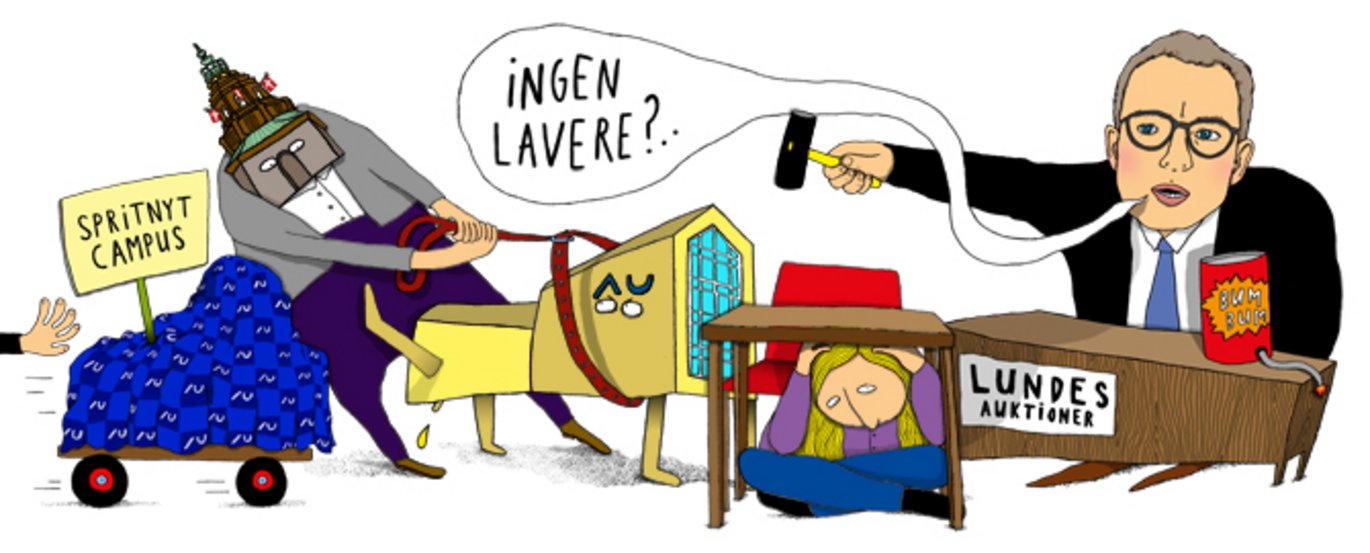
2017 was a year where politicians were very proactive when it came to keeping the universities on a short leash. But when the government with Minister Søren Pind (The Liberal Party) leading the way presented its bill for a better framework for the management of the universities, which would among other things approve the chairs of the university boards, the leash became just a little too short in the universities' opinion.
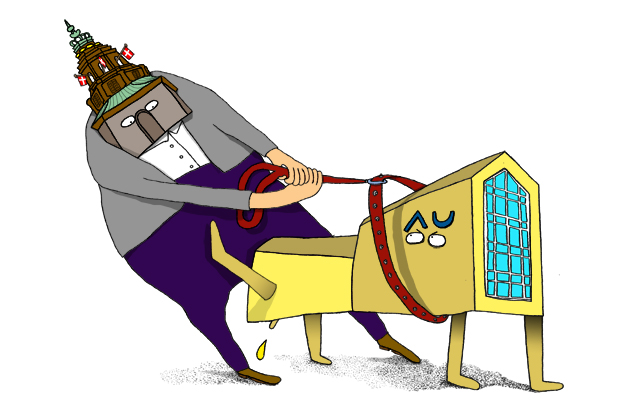
Illustration: Louise Thrane Jensen
Overstepped, minister! cried the universities together, calling the proposal a break with the tradition for politically independent boards. And when the bill was adopted in April, the ministerial appointment of chairs had also been removed from its wording.
READ MORE: Part II: The year in review at AU
In May, the long-awaited proposals for a new subsidy system for post-secondary educations was presented. This time with focus on quality. At least according to the Minister for Higher Education and Science. However, the rector and the chair of the student council found it difficult to spot the quality. Neither did the new employment and completion parameters attract much praise.
"When the government carried out the better framework for the management at the universities reform, they promised less micro-management. But I think that this proposal breaks with this promise because the model utilises strong incentive components," said chair of the student council Emil Outzen.
The rector agreed:
"We already have a study progress reform that we’re currently implementing, and it’s the same with the degree programme resizing. Therefore, I can’t see the need for new completion and employment parameters."
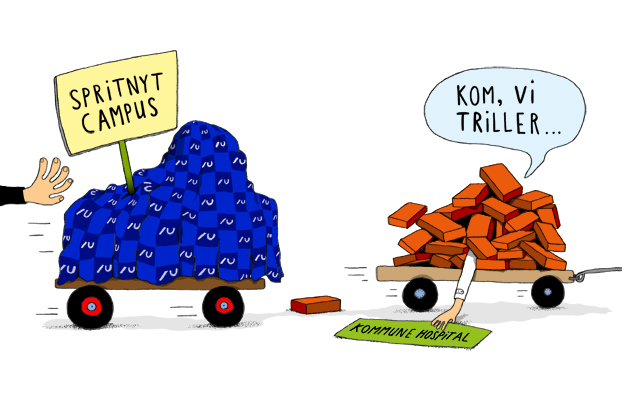 Illustration: Louise Thrane Jensen
Illustration: Louise Thrane Jensen
Thumbs up for campus 2.0
Then again, the rector could certainly see the need for a new campus area. Last year, the research foundation’s real estate company (FEAS, as it’s known in Danish) purchased the site of the former Aarhus Municipal Hospital and will now develop a new university campus there together with Aarhus University.
The year was not even two weeks old when it was announced that a team of consultants led by AART architects from Aarhus would act as consultants for FEAS and AU on the development of AU's new campus. With just a month of the year left, Aarhus City Council gave the thumbs up to the proposed local plan for the new campus area. The local plan has now been sent for public consultation. Meanwhile, the doctors and nurses who currently work at the site will move to the new mega-hospital in Skejby. And from 2020, the university can begin moving into the new campus.
Aiming for the stars
AU is not only expanding its territory across Nørrebrogade; the university is also aiming for the stars and in March it got its own space programme. With help from a small homemade satellite, students and researchers now have direct access to carry out scientific experiments in space. The satellite has been assembled by a group of students, and they are also the ones who will transport the satellite to Houston before it is sent to the international space station ISS next year.
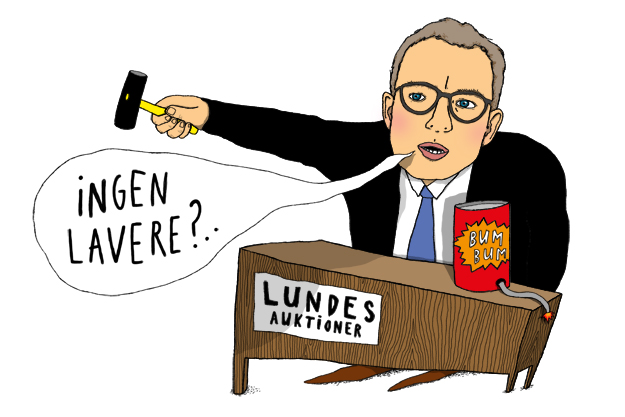
Illustration: Louise Thrane Jensen
The minister drooped a financial time bomb
In June, the university was again seeing stars after a crushing blow from the Minister for Food, Agriculture and Fisheries, Esben Lunde Larsen (The Liberal Party). He announced that the consultancy and research tasks that university researchers carry out on behalf of the authorities, would be sent in open competition between the universities. The minister thus drooped a financial time bomb on AU, as the university annually earns up to DKK 400 million from carrying out these kinds of tasks for the authorities. An unwise decision by the minister, according to Rector Brian Bech Nielsen, who was disappointed that the universities had not been consulted about the decision.
With the Danish government's Finance Bill, it was also clear that the government was extending the requirement for the universities to save two per cent per year for an additional year. One way to slim down an overfed sector.
Global protest against fake news and alternative facts
Someone else making news last year was the American President Donald Trump, who moved into the White House in January. Trump has made life difficult for American environmental and climate researchers and has called research into global warming a hoax. This lack of political respect for research findings (not only in USA) and a general trend towards propagating fake news led to people joining together in a global March for Science in the spring. Also in Denmark, where there were marches in both Aarhus and Copenhagen.
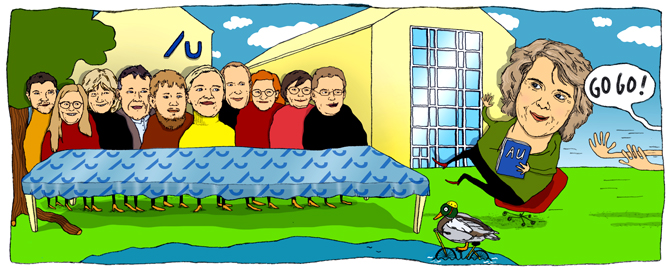
Illustration: Louise Thrane Jensen
New men at the helm – and a single woman at the head of the table
It would not be strictly correct to call it a procession, but there were nevertheless changes in a number of prominent positions at AU during the first six months of 2017. In February, former EU Commissioner Connie Hedegaard took her place at the head of table as chair of AU's board and replaced Michael Christiansen.
The Faculty of Health got a new dean as Lars Bo Nielsen bought a one-way ticket across the Great Belt and left his previous position as head of the Department of Clinical Medicine at the University of Copenhagen. AU's Association for PhD students, AUPA, elected a new chair in the form of Søren Kærgaard Slipsager.
The Student Council also chose a new chair as Emil Outzen took over from Sune Koch Rønnow in February. Conservative Students, which is one of AU’s student associations, also got a new chair in the shape of Kim Risbjerg Madsen. He started out by banging his head against a brick wall (figuratively speaking) when he tried to arrange a lecture by Emeritus Professor Helmuth Nyborg, who has researched differences in intelligence between genders and races. All of a sudden it turned out to be extremely difficult to book somewhere to hold the lecture at AU. A limitation of free speech? According to AU’s head of communications not at all. It was instead due to a communication error.
But there was one area that once again did not have a head; the Department of Economics and Business Economics. Professor Carsten Sørensen resigned from his position in the early spring after just 13 months in the job. Dean Thomas Pallesen took over the management of the department until Niels Haldrup took over as acting head in August. This position has now been advertised.
In the administration at Aarhus BSS, the opposite happened. Here, positions were done away with at the beginning of the year as a result of the closure of the Department of Business Communication. Four employees had to leave AU.
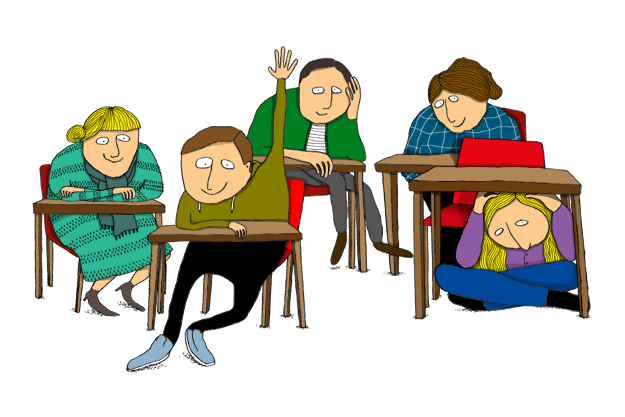
Illustration: Louise Thrane Jensen
When student life gets tough and leads to writer's cramp
AU took the temperature of the students' well-being with the study environment survey that the universities must carry out every three years. The conclusion was that things are going quite well. 87 per cent of AU’s students generally feel comfortable as students at Aarhus University. But the number of stressed students had increased again despite a targeted effort. One in five students experience severe stress symptoms on a daily basis, and one in four find that there is fierce competition between students, in particular at Aarhus BSS.
That studying can be painful – literally so – is something that a couple of students from political science could also report. Specifically, with the three-hour written exam as the source of the pain because their economic equations must be written by hand on four layers of carbon paper. Rather old-fashioned in the students’ opinion. The studies administration agreed and announced they were already in the process of testing digital exams. The tests went well, so that the students could finally wave goodbye to writer’s cramp.

Graphics: Astrid Reitzel
AU's turn to take an exam
AU also took an exam this year. The examiner was the Danish Accreditation Institution, which has the task of ensuring the quality and relevance of higher education degree programmes. AU was given a mark of 'conditional positive'. Not that bad, but not that good either. The re-examination takes place during the course of 2018. We can hope that the Danish Accreditation Agency is satisfied next time.
Days off under threat
Satisfaction was not the right word to describe state employees when an arbitration ruling in January made clear that the Danish Ministry of Taxation had been entitled to terminate three employer-paid days off. But AU's employees could stop worrying when AU's University Director Arnold Boon commented on the matter:
"The management team has no plans to cancel the three days off. They are part of an agreement between management and employees, and we see no reason to alter that."
Later in the year, the State employer the Agency for the Modernisation of Public Administration opened for the possibility of abolishing state employees’ paid lunch break, and Sophie Løhde (the Liberal Party) recently used figures from the Danish Ministry of Finance to claim that public sector salaries had risen more than those in the private sector since 2008. Which goes to show that things are warming up before next year's collective bargaining negotiations.
Warm is not how you’d characterise the summer 2017 – more on that in the next section of the year in review.
Translated by Peter Lambourne

